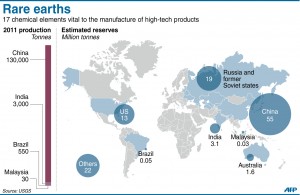EU fights to catch Chinese in Greenland rare-earths gold rush

Graphic factfile on reserves and production of rare earth minerals worldwide. China has started stockpiling rare earths for strategic reserves, according to a state-backed newspaper. Greenland is a frontier Eldorado with untapped reserves of critical rare earths under the Arctic ice-cap but a nimble China has already stolen a march in getting access, EU industry commissioner Antonio Tajani warns.
BRUSSELS—Greenland is a frontier Eldorado with untapped reserves of critical rare earths under the Arctic ice-cap but a nimble China has already stolen a march in getting access, EU industry commissioner Antonio Tajani warns.
The Italian traveled to Greenland on June 16 to initial a deal for the European Union to share exploitation rights to rare earth metal ores in return for technological and environmental mining know-how.
Buried under massive ice fields lie deposits of precious minerals and base elements needed to keep everyday modernity on the move – without them there would be no energy-efficient lightbulbs, smartphones, electric cars or wind turbines to name just a few.
The EU, the world’s biggest single market, is entirely dependent on imports for 14 out of a group of 17 minerals collectively known as “rare earths,” a closely fought-over market currently dominated by China, which guards these resources tightly.
“The Chinese president (Hu Jintao) arrived the next day,” Tajani told AFP in an interview. “They’re already working the ground – they bought a British company and sent in 2,000 Chinese miners.”
The unwieldy machinery of EU politics means the June deal will not be examined by ministers from its 27 member states until next month.
While still a Danish territory, Greenland negotiated an exit nearly 30 years ago from what is now the EU and despite being subject to some treaty provisions, it is almost wholly autonomous since another referendum on relations with Copenhagen in 2009.
The Tajani deal will see Europe pay 35 percent of earnings from mining ventures restricted to Greenland’s coastal strip.
A giant land-and-ice mass, Greenland has a population only the size of a small town (some 50,000 people) and according to Tajani, they were “hit badly” by the banking crisis on neighboring Iceland and “need the money.”
They are also “very concerned about environmental protection,” which, Tajani says, gives the EU a potential advantage over Chinese and other rivals in this modern-day gold rush.
The EU tries hard to promote high environmental standards and Tajani said the Greenlanders are keener on the European approach given the growing attention paid to Arctic mineral and energy resources which pose huge technical challenges to extract.
They depend entirely on imports for cobalt, platinum and titanium; for 83 percent of its iron ore; 74 percent of its lithium; and 54 percent of its copper, highlighting supplies classed by the European Commission as critical.
China controls more than one-third of known accessible rare earths reserves, protecting them with export quotas which the EU, Japan and the United States have together challenged at the World Trade Organization.
“We are engaged in a ‘war’ with the Chinese” over these precious resources, one of Tajani’s advisers said, with the matter likely to make for a strained September 20 summit in Brussels.
At the same time, Tajani said there was no reason for despair – there are substitutes and the EU was working very closely with the United States and Japan on research.
Recycling is another option. “Each year, each citizen of the EU chucks out the equivalent of 17 kilos (35 pounds) of electrical and electronic waste – that is a real urban mine,” the adviser added.
There are also reserves within the EU estimated to be worth 100 billion euros which could be developed, with Tajani stressing the need to end the EU’s dependence on imports.